Iran to back Hezbollah if 'Israel' widens war on Lebanon: Official
Iran's former foreign minister and head of Iran's Strategic Council on Foreign Relations underscores Iran's unequivocal support for Hezbollah in the event of a full-scale war initiated by "Israel", which he emphasized would engulf the region.
-

Head of Iran’s Strategic Council on Foreign Relations, Kamal Kharrazi, undated. (PressTV)
If "Israel" launches an all-out war against Lebanon, it would risk triggering a regional war in which Tehran and the Axis of Resistance are prepared to support the Islamic Resistance in Lebanon - Hezbollah, with all means to confront the Israeli aggression, said former Iranian FM and Head of Iran's Strategic Council on Foreign Relations Kamal Kharrazi in an interview with the Financial Times (FT).
Kharrazi told FT that Iran was “not interested” in a regional war and urged the US to put pressure on "Israel" to prevent further escalation, stressing that in the case of a full-scale war, “All Lebanese people, Arab countries, and members of the Axis of Resistance will support Lebanon against Israel.”
In the interview, he explained that “There would be a chance of expansion of the war to the whole region, in which all countries including Iran would become engaged,” adding that “in that situation, we would have no choice, but to support Hezbollah by all means.”
“The expansion of war is not in the interest of anyone — not Iran or the US," he said.
Since the outbreak of the war, Hezbollah and Israeli occupation forces have engaged in confrontations, the Yemeni Armed Forces have carried out operations in the Red Sea and launched missiles and drones at "Israel", the Resistance movements in Iraq and Syria have targeted US troops and fired missiles and drones at "Israel", and Iran launched the first direct Iranian strike against "Israel" from its soil.
Israeli war on Lebanon and Iranian elections - a closer look
In a similar context, earlier last month, Iran's Permanent Mission to the United Nations warned that a full-scale Israeli attack on Lebanon would lead to an "obliterating" war.
The concerns arise as Iranians prepare for a transition to a new government following the death of President Ebrahim Raisi in a helicopter crash in May. A run-off presidential election is scheduled for Friday.
Kharrazi indicated that although there might be "some differences" in approach depending on the election outcome, the overarching foreign policy strategy, determined by Sayyed Khamenei, would remain unchanged.
He highlighted that the election presented an opportunity for "new openings" between Iran and the West. However, achieving this would require Western states to step back from current policies and negotiate with Iran on equal footing and with mutual respect, according to FT.
Kharrazi added, “If they decide to cooperate, we are ready for cooperation.”
New JCPOA opening
He stated that the Islamic Republic is prepared to engage in indirect talks with Washington concerning Tehran's nuclear program under a new government, provided it paves the way for the US to rejoin the 2015 agreement Iran signed with global powers, known as the JCPOA.
Since former US President Donald Trump unilaterally withdrew from the JCPOA in 2018 and imposed extensive sanctions on Iran, tensions have persisted between Iran and the West. Although the Biden administration attempted to revive the accord, diplomatic endeavors fell apart amid US obstinance and Washington's refusal to remove sanctions placed by Trump on Iran.
Iran has been enriching uranium to 60% purity, nearing weapons-grade levels, for over three years. According to experts, Iran now possesses enough fissile material to manufacture approximately three nuclear bombs in a matter of weeks.
That said, Kharrazi explained, "We are not pursuing the development of nuclear weapons," referencing a fatwa issued by Sayyed Khamenei in 2003 that prohibits their production. However, he acknowledged that if Iran were confronted with an existential threat, "naturally, we would have to reconsider our doctrine," without elaborating further on the specifics.
Sanctions on Iran
He further warned that if the West were to invoke "snapback" provisions to reinstate UN sanctions lifted under the JCPOA due to Iran's ongoing nuclear program expansion, "there would be a severe reaction from Iran in terms of changing its nuclear strategy."
"Thus far, we have not made a decision to exceed 60 percent enrichment," he clarified. "However, we have been focused on broadening our expertise through the utilization of various machines and configurations."

 4 Min Read
4 Min Read








